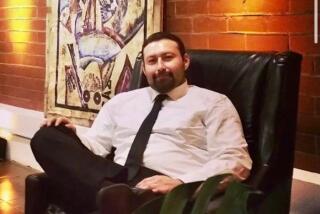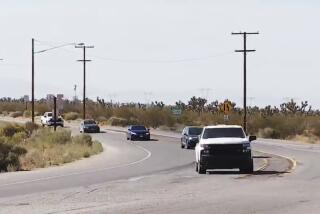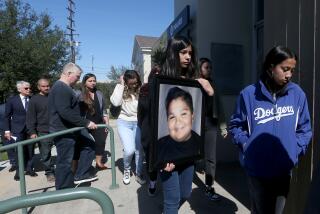Driver Gets Prison Term in Death of CHP Officer
- Share via
Delivering a sentence that left her in tears, a judge sent a drunk driver to prison for 15 years to life for killing a California Highway Patrol officer who was helping a motorist stranded on the Hollywood Freeway.
In the unusually poignant courtroom drama, Kimberlee Hinman, the widow of Officer Bruce Thomas Hinman, brought tears to the eyes of Los Angeles County Superior Court Judge Darlene E. Schempp.
“We have a uniform with no one to fill it,” she told Schempp as her twin 6-year-old boys, Mitchell and Morgan, strained to see the proceedings from their courtroom folding chairs.
“It’s an incredible hole that will never be filled,” Hinman said.
Her boys wish “Daddy could come home,” she said. “It’s a wish I’ll never be able to fulfill for them.”
Defendant Ramiro Palma Rodriguez, 44, bowed his head and begged the Hinman family for forgiveness.
“I regret what I did and I feel very bad in my heart,” Rodriguez said as his wife quietly wept within the embrace of the couple’s two teenage sons. “I never in my life thought about doing anything wrong to anyone.”
Schempp said: “This is the most difficult decision I have ever been forced to make.”
The judge said she believed that Rodriguez was truly remorseful for the Sept. 26, 1995, death of the eight-year CHP veteran.
A jury convicted Rodriguez last month of second-degree murder, finding that his actions were too negligent to fall under a less severely punished crime of vehicular manslaughter.
During the trial, Deputy Dist. Atty. Craig Richman argued that Rodriguez, who had no previous criminal record, was aware he could kill someone after he drank until intoxicated then got behind the wheel of his car.
“This loss was suffered by the people of the state of California,” said Richman, adding that Hinman had “dedicated his life to protecting people and keeping them safe.”
Richman said it was a case of “selflessness versus selfishness.”
As he had during the trial, Rodriguez’s court-appointed public defender, Dror Toister, acknowledged that his client was responsible, but suggested that the murder conviction was because the victim was a highway patrolman.
Authorities had said Rodriguez could have drawn as little as probation if convicted on the lesser charge.
According to the probation and sentencing report, Rodriguez is a legal immigrant from Mexico who worked for a Los Angeles pest control company and rented a converted San Fernando garage, where he lived with his wife and three children.
He normally consumed three beers, according to court records. When he was arrested, he told authorities that he and several friends had bought two six-packs of beer.
On Sept. 26, Hinman was dispatched about 9:30 p.m. to the interchange of the Hollywood and Ventura freeways to help three teenagers who were stranded on their way home from Universal CityWalk.
In what colleagues called a typical act of helpfulness, Hinman pushed the disabled car along the shoulder of the road to a safer location while two girls sat in the car’s front seat.
After pushing the car, Hinman stood in front of the vehicle while one of the youths called a relative for help.
Suddenly, an auto driven by Rodriguez swerved across the dirt median, jumped a curb and went airborne, striking the rear of the car.
The disabled vehicle was pushed onto Hinman, who was trapped under the car and lost consciousness. He became comatose and died a week later after being removed from life support.
In October, Hinman’s colleagues dedicated a monument to him at the West Valley station in Woodland Hills. Earlier in the year, state legislators in Sacramento passed a bill naming the interchange where he was struck after the officer.
In the corridor after the sentencing, his widow, flanked by television cameras, walked with her twin boys.
“I know [Rodrigues] was remorseful,” she said. “I hope the point gets out to people that you can’t drink and drive.”
More to Read
Sign up for Essential California
The most important California stories and recommendations in your inbox every morning.
You may occasionally receive promotional content from the Los Angeles Times.









